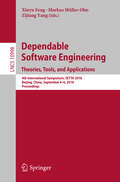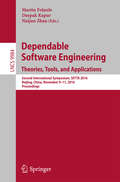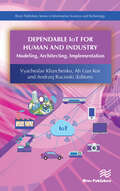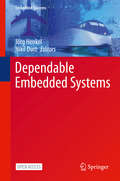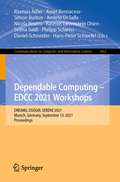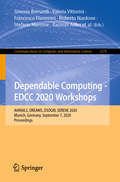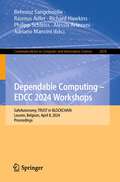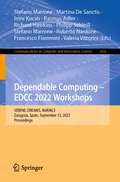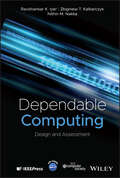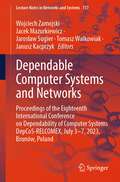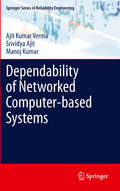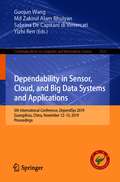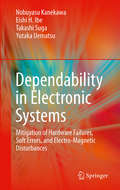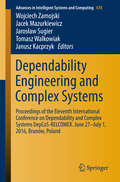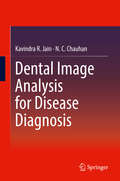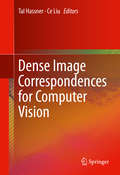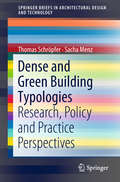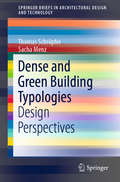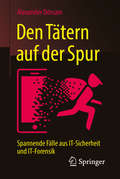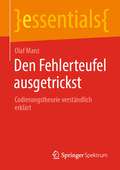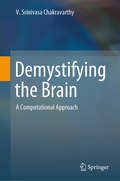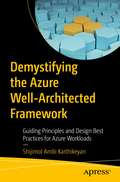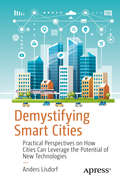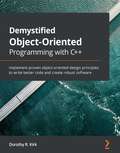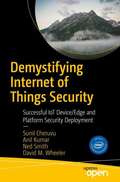- Table View
- List View
Dependable Software Engineering. Theories, Tools, and Applications: 4th International Symposium, Setta 2018, Beijing, China, September 4-6, 2018, Proceedings (Lecture Notes in Computer Science #10998)
by Zijiang Yang Markus Müller-Olm Xinyu FengThis book constitutes the proceedings of the Third International Symposium on Dependable Software Engineering: Theories, Tools, and Applications, SETTA 2018, held in Beijing, China, in September 2018. The 9 full papers presented together with 3 short papers were carefully reviewed and selected from 22 submissions. The purpose of SETTA is to provide an international forum for researchers and practitioners to share cutting-edge advancements and strengthen collaborations in the field of formal methods and its interoperability with software engineering for building reliable, safe, secure, and smart systems.
Dependable Software Engineering: Theories, Tools, and Applications
by Naijun Zhan Deepak Kapur Martin FränzleThis book constitutes the refereed proceedings of the Second International Symposium on Dependable Software Engineering: Theories, Tools, and Applications, SETTA 2016, held in Beijing, China, in November 2016. The 17 full papers presented together with 3 short papers were carefully reviewed and selected from 58 submissions. The aim of the symposium is to bring together international researchers and practitioners in the field of software technology. Its focus is on formal methods and advanced software technologies, especially for engineering complex, large-scale artifacts like cyber-physical systems, networks of things, enterprise systems, or cloud-based services.
Dependable IoT for Human and Industry: Modeling, Architecting, Implementation (River Publishers Series In Information Science And Technology Ser.)
by Vyacheslav Kharchenko Ah Lian Kor Andrzej RucinskiThere are numerous publications which introduce and discuss the Internet of Things (IoT). In the midst of these, this work has several unique characteristics which should change the reader’s perspective, and in particular, provide a more profound understanding of the impact of the IoT on society. Dependable IoT for Human and Industry covers the main aspects of Internet of Things and IoT based systems such as global issues of applications, modeling, development and implementation of dependable IoT for different human and industry domains. Technical topics discussed in the book include: Introduction in Internet of vital and trust Things Modelling and assessment techniques for dependable and secure IoT systems Architecting and development of IoT systems Implementation of IoT for smart cities and drone fleets; business and blockchain, transport and industry Training courses and education experience on Internet and Web of ThingThe book contains chapters which have their roots in the International Conference IDAACS 2017, and Workshop on Cyber Physical Systems and IoT Dependability CyberIoT-DESSERT 2017.
Dependable Embedded Systems (Embedded Systems)
by Jörg Henkel Nikil DuttThis Open Access book introduces readers to many new techniques for enhancing and optimizing reliability in embedded systems, which have emerged particularly within the last five years. This book introduces the most prominent reliability concerns from today’s points of view and roughly recapitulates the progress in the community so far. Unlike other books that focus on a single abstraction level such circuit level or system level alone, the focus of this book is to deal with the different reliability challenges across different levels starting from the physical level all the way to the system level (cross-layer approaches). The book aims at demonstrating how new hardware/software co-design solution can be proposed to ef-fectively mitigate reliability degradation such as transistor aging, processor variation, temperature effects, soft errors, etc.Provides readers with latest insights into novel, cross-layer methods and models with respect to dependability of embedded systems;Describes cross-layer approaches that can leverage reliability through techniques that are pro-actively designed with respect to techniques at other layers;Explains run-time adaptation and concepts/means of self-organization, in order to achieve error resiliency in complex, future many core systems.
Dependable Computing - EDCC 2021 Workshops: DREAMS, DSOGRI, SERENE 2021, Munich, Germany, September 13, 2021, Proceedings (Communications in Computer and Information Science #1462)
by Rasmus Adler Amel Bennaceur Simon Burton Amleto Di Salle Nicola Nostro Rasmus Løvenstein Olsen Selma Saidi Philipp Schleiss Daniel Schneider Hans-Peter SchwefelThis book constitutes refereed proceedings of the Workshops of the 17th European Dependable Computing Conference, EDCC: Second Worskhop on Dynamic Risk Management for Autonomous Systems, DREAMS 2021, Third Workshop on Dependable Solutions for Intelligent Electricity Distribution Grids, DSOGRI 2021, 13th Workshop on Software Engineering for Resilient Systems, SERENE 2021, held in September 2021. Due to the COVID-19 pandemic the workshops were held virtually. The 14 workshop papers presented were thoroughly reviewed and selected from 22 submissions. The workshop papers complement the main conference topics by addressing dependability or security issues in specic application domains or by focussing in specialized topics, such as system resilience.
Dependable Computing - EDCC 2020 Workshops: AI4RAILS, DREAMS, DSOGRI, SERENE 2020, Munich, Germany, September 7, 2020, Proceedings (Communications in Computer and Information Science #1279)
by Simona Bernardi Valeria Vittorini Francesco Flammini Roberto Nardone Stefano Marrone Rasmus Adler Daniel Schneider Philipp Schleiß Nicola Nostro Rasmus Løvenstein Olsen Amleto Di Salle Paolo MasciThis book constitutes refereed proceedings of the Workshops of the 16th European Dependable Computing Conference, EDCC: Workshop on Articial Intelligence for Railways, AI4RAILS 2020, Worskhop on Dynamic Risk Management for Autonomous Systems, DREAMS 2020, Workshop on Dependable Solutions for Intelligent Electricity Distribution Grids, DSOGRI 2020, Workshop on Software Engineering for Resilient Systems, SERENE 2020, held in September 2020. Due to the COVID-19 pandemic the workshops were held virtually. The 12 full papers and 4 short papers were thoroughly reviewed and selected from 35 submissions. The workshop papers complement the main conference topics by addressing dependability or security issues in specic application domains or by focussing in specialized topics, such as system resilience.
Dependable Computing – EDCC 2024 Workshops: SafeAutonomy, TRUST in BLOCKCHAIN, Leuven, Belgium, April 8, 2024, Proceedings (Communications in Computer and Information Science #2078)
by Behrooz Sangchoolie Rasmus Adler Richard Hawkins Philipp Schleiss Alessia Arteconi Adriano ManciniThis book constitutes the refereed proceedings of Workshops held at the 19th European Dependable Computing Conference, EDCC 2024: First Workshop on Safe Autonomous Systems, SafeAutonomy 2024, and the First Workshop on the Role of TRUST in the implementation of Digital Technologies: Blockchain Technology and Artificial Intelligence in Smart Cities, TRUST IN BLOCKCHAIN 2024. The 13 workshop papers presented in this book were thoroughly reviewed and selected from 14 submissions. The TRUST IN BLOCKCHAIN workshop accepted extended abstract submissions, whereas the SafeAutonomy workshop accepted regular technical papers, case studies, PhD forum papers, as well as position papers. They deal with latest research results on theory, techniques, systems, and tools for the design, validation, operationand evaluation of dependable and secure computing systems.
Dependable Computing – EDCC 2022 Workshops: SERENE, DREAMS, AI4RAILS, Zaragoza, Spain, September 12, 2022, Proceedings (Communications in Computer and Information Science #1656)
by Stefano Marrone Martina De Sanctis Imre Kocsis Rasmus Adler Richard Hawkins Philipp Schleiß Roberto Nardone Francesco Flammini Valeria VittoriniThis book constitutes refereed proceedings of the Workshops of the 18th European Dependable Computing Conference, EDCC: 13th Workshop on Software Engineering for Resilient Systems, SERENE 2022; Third Worskhop on Dynamic Risk Management for Autonomous Systems, DREAMS 2022, Third Workshop on Artificial Intelligence for Railways, AI4RAILS, held in Zaragoza, Spain, in September 2022. The 11 workshop papers presented were thoroughly reviewed and selected from 22 submissions. The workshop papers complement the main conference topics by addressing dependability or security issues in specic application domains or by focussing in specialized topics, such as system resilience.
Dependable Computing: Design and Assessment (IEEE Press)
by Ravishankar K. Iyer Zbigniew T. Kalbarczyk Nithin M. NakkaDependable Computing Covering dependability from software and hardware perspectives Dependable Computing: Design and Assessment looks at both the software and hardware aspects of dependability. This book: Provides an in-depth examination of dependability/fault tolerance topics Describes dependability taxonomy, and briefly contrasts classical techniques with their modern counterparts or extensions Walks up the system stack from the hardware logic via operating systems up to software applications with respect to how they are hardened for dependability Describes the use of measurement-based analysis of computing systems Illustrates technology through real-life applications Discusses security attacks and unique dependability requirements for emerging applications, e.g., smart electric power grids and cloud computing Finally, using critical societal applications such as autonomous vehicles, large-scale clouds, and engineering solutions for healthcare, the book illustrates the emerging challenges faced in making artificial intelligence (AI) and its applications dependable and trustworthy. This book is suitable for those studying in the fields of computer engineering and computer science. Professionals who are working within the new reality to ensure dependable computing will find helpful information to support their efforts. With the support of practical case studies and use cases from both academia and real-world deployments, the book provides a journey of developments that include the impact of artificial intelligence and machine learning on this ever-growing field. This book offers a single compendium that spans the myriad areas in which dependability has been applied, providing theoretical concepts and applied knowledge with content that will excite a beginner, and rigor that will satisfy an expert. Accompanying the book is an online repository of problem sets and solutions, as well as slides for instructors, that span the chapters of the book.
Dependable Computer Systems and Networks: Proceedings of the Eighteenth International Conference on Dependability of Computer Systems DepCoS-RELCOMEX, July 3–7, 2023, Brunów, Poland (Lecture Notes in Networks and Systems #737)
by Wojciech Zamojski Jacek Mazurkiewicz Jarosław Sugier Tomasz Walkowiak Janusz KacprzykThe book includes papers about various problems of dependable operation of computer systems and networks, which were presented during the 18th DepCoS-RELCOMEX conference. Their collection can be an interesting source material for scientists, researchers, practitioners, and students who are dealing with design, analysis, and engineering of computer systems and networks and must ensure their dependable operation. The increasing role of artificial intelligence algorithms and tools in modern information technology and computer engineering, especially rapid expansion of tools based on deep learning methods, calls for extending our view on system dependability. Selection of papers in these proceedings not only illustrates a wide-ranging variety of multidisciplinary topics which should be considered in this context but also proves that virtually all areas of contemporary computer systems and networks must take into account an aspect of dependability.
Dependability of Networked Computer-based Systems
by Manoj Kumar Srividya Ajit Ajit Kumar VermaThe measurement of dependability attributes on real systems is a very time-consuming and costly affair, making analytical or simulation modeling the only viable solutions. Dependability of Networked Computer-based Systems explores reliability, availability and safety modeling of networked computer-based systems used in life-critical applications such as avionics, nuclear power plants, automobiles and chemical process industries. Dependability of Networked Computer-based Systems gives an overview of basic dependability modeling concepts and addresses new challenges in dependability modeling of networked computer-based systems, as well as new trends, their capabilities and limitations. It covers a variety of dependability modeling methods: stochastic processes,Markov and semi-Markov models,response-time distribution,stochastic Petri-net-based modeling formalisms, andMonte Carlo simulation models.Dependability of Networked Computer-based Systems provides students and researchers with a detailed overview of dependability models and analysis techniques. Practicing engineers will also find this text a useful guide to decision-making based on system dependability at the design, operation and maintenance stages.
Dependability in Sensor, Cloud, and Big Data Systems and Applications: 5th International Conference, DependSys 2019, Guangzhou, China, November 12–15, 2019, Proceedings (Communications in Computer and Information Science #1123)
by Guojun Wang Md Zakirul Alam Bhuiyan Sabrina De Capitani di Vimercati Yizhi RenThis book constitutes the refereed proceedings of the 5th International Conference on Dependability in Sensor, Cloud, and Big Data Systems and Applications, DependSys, held in Guangzhou, China, in November 2019.The volume presents 39 full papers, which were carefully reviewed and selected from 112 submissions. The papers are organized in topical sections on dependability and security fundamentals and technologies; dependable and secure systems; dependable and secure applications; dependability and security measures and assessments; explainable artificial inteligence for cyberspace.
Dependability in Electronic Systems
by Yutaka Uematsu Nobuyasu Kanekawa Eishi H. Ibe Takashi SugaThis book covers the practical application of dependable electronic systems in real industry, such as space, train control and automotive control systems, and network servers/routers. The impact from intermittent errors caused by environmental radiation (neutrons and alpha particles) and EMI (Electro-Magnetic Interference) are introduced together with their most advanced countermeasures. Power Integration is included as one of the most important bases of dependability in electronic systems. Fundamental technical background is provided, along with practical design examples. Readers will obtain an overall picture of dependability from failure causes to countermeasures for their relevant systems or products, and therefore, will be able to select the best choice for maximum dependability.
Dependability Engineering and Complex Systems
by Wojciech Zamojski Jacek Mazurkiewicz Jarosław Sugier Tomasz Walkowiak Janusz KacprzykThese proceedings present the results of the Eleventh International Conference on Dependability and Complex Systems DepCoS-RELCOMEX which took place in a picturesque Brunów Palace in Poland from 27th June to 1st July, 2016. DepCoS-RELCOMEX is a series of international conferences organized annually by Department of Computer Engineering of WrocÅ,aw University of Science and Technology since 2006. The roots of the series go as far back as to the seventies of the previous century - the first RELCOMEX conference took place in 1977 - and now its main aim is to promote a multi-disciplinary approach to dependability problems in theory and engineering practice of complex systems. Complex systems, nowadays most often computer-based and distributed, are built upon a variety of technical, information, software and human resources. The challenges in their design, analysis and maintenance not only originate from the involved technical and organizational structures but also from the complexity of the information processes that must be efficiently executed in a diverse, often hostile operational environment. Traditional methods of reliability evaluation focused only on technical resources are usually insufficient in this context and more innovative, multidisciplinary methods of dependability analysis must be applied. The diversity of the topics which need to be considered is well illustrated by the selection of the submissions in these proceedings with their subjects ranging from mathematical models and design methodologies through software engineering and data security issues up to practical problems in technical, e. g. transportation, systems.
Dental Image Analysis for Disease Diagnosis
by Kavindra R. Jain N. C. ChauhanThis book provides an overview of computational approaches to medical image examination and analysis in oral radiology, utilizing dental radiograph to detect and diagnose dental caries in cases of decayed teeth. Coverage includes basic image processing techniques; approaches for Region of Interest extraction and analysis; and the role of computational clustering techniques for segmentation of teeth and dental caries. The book also presents a novel multiphase level set method for automatic segmentation of dental radiographs.
Dense Image Correspondences for Computer Vision
by Tal Hassner Ce LiuThis book describes the fundamental building-block of many new computer vision systems: dense and robust correspondence estimation. Dense correspondence estimation techniques are now successfully being used to solve a wide range of computer vision problems, very different from the traditional applications such techniques were originally developed to solve. This book introduces the techniques used for establishing correspondences between challenging image pairs, the novel features used to make these techniques robust, and the many problems dense correspondences are now being used to solve. The book provides information to anyone attempting to utilize dense correspondences in order to solve new or existing computer vision problems. The editors describe how to solve many computer vision problems by using dense correspondence estimation. Finally, it surveys resources, code and data, necessary for expediting the development of effective correspondence-based computer vision systems.
Dense and Green Building Typologies: Research, Policy and Practice Perspectives (SpringerBriefs in Architectural Design and Technology)
by Thomas Schröpfer Sacha MenzIn this book, academics, policy makers, developers, architects and landscape architects provide a systematic review of the environmental, social, economic and design benefits of dense and green building types in high-density urban contexts and discuss how these can support higher population densities, higher standards of environmental sustainability and enhanced live ability in future cities.
Dense and Green Building Typologies: Design Perspectives (SpringerBriefs in Architectural Design and Technology)
by Thomas Schröpfer Sacha MenzIn this book, leading architects and landscape architects provide their perspectives on the design of dense and green building types in high-density urban contexts that can support higher population densities, higher standards of environmental sustainability and enhanced liveability in future cities.
Den Tätern auf der Spur
by Alexander DörsamAus dem Alltag eines digitalen Ersthelfers Der IT-Sicherheitsexperte Alexander Dörsam entführt Sie mit seinem Buch in die spannende Welt von Hacking, Unternehmenserpressung, Spionage und digitalem Vandalismus. Anhand von realen IT-Sicherheitsvorfällen erfahren Sie, wie Angreifer in Firmenstrukturen eindringen, welche Methoden dafür eingesetzt werden und welche Folgen das haben kann. Doch wie schütze ich mich oder mein Unternehmen? Was ist zu tun bei einem digitalen Notfall? Dörsam hilft Ihnen nicht selbst Opfer zu werden, zeigt das IT-Krisenmanagement und gibt Hinweise zur Ersthilfe bei IT-Sicherheitsvorfällen. Ein fesselndes Buch für alle, die mehr über aktuelle digitale Bedrohungen erfahren wollen.
Den Fehlerteufel ausgetrickst: Codierungstheorie verständlich erklärt (essentials)
by Olaf ManzDie Codierungstheorie, die sich mit Verfahren zur Erkennung und Korrektur von Fehlern bei Datenübertragungen und beim Auslesen von Speichermedien beschäftigt, ist heute aus Technik, Wirtschaft und aus unserem Alltag nicht mehr wegzudenken. Das Buch stellt anschaulich und leicht verständlich die wichtigsten, auch in der Praxis verwendeten Methoden vor. Dazu gehören Prüfziffern und CRC-Verfahren zur Fehlererkennung. Eingegangen wird aber auch auf historisch und für den heutigen Alltag wichtige Codes zur Fehlerkorrektur. Hierzu zählen insbesondere die Hamming-, Reed-Muller-, Reed-Solomon-, Faltungs- und Turbo-Codes. Verfahren, die darauf basieren, sind unter anderem beim Digitalfernsehen, beim Internet, beim Mobilfunk, in der Satellitennavigation, in der Raumfahrt, bei CDs und DVDs und bei QR-Codes implementiert.
Demystifying the Brain: A Computational Approach
by V. Srinivasa ChakravarthyThis book presents an emerging new vision of the brain, which is essentially expressed in computational terms, for non-experts. As such, it presents the fundamental concepts of neuroscience in simple language, without overwhelming non-biologists with excessive biological jargon. In addition, the book presents a novel computational perspective on the brain for biologists, without resorting to complex mathematical equations.It addresses a comprehensive range of topics, starting with the history of neuroscience, the function of the individual neuron, the various kinds of neural network models that can explain diverse neural phenomena, sensory-motor function, language, emotions, and concluding with the latest theories on consciousness. The book offers readers a panoramic introduction to the “new brain” and a valuable resource for interdisciplinary researchers looking to gatecrash the world of neuroscience.
Demystifying the Azure Well-Architected Framework: Guiding Principles and Design Best Practices for Azure Workloads
by Shijimol Ambi KarthikeyanUse the Azure well-architected framework to deploy your workloads in Azure and align them with Microsoft recommended best practices. This book takes a deep dive into the five architecture elements (cost optimization, performance efficiency, operational excellence, reliability, and security) and provides practical guidance on incorporating them into your architecture.The book starts with an introduction to the relevance of the well-architectured framework and why it should form the baseline of your design decisions when deploying applications in Azure. You will learn how customers can optimize the cost of deployment in Azure and understand all aspects of implementation. The book takes you through the practices and processes to be followed to run applications smoothly and you will understand the end-to-end process of design, deployment, and monitoring. You will go through paradigms for designing environments to meet different performance demands. The book covers how to build resilient and highly available applications in Azure with a sample configuration for monitoring. And you will learn how to enable security to ensure confidentiality and integrity of workloads in Azure.After reading this book, you will know the practical nuances of designing high-performing applications in the Microsoft cloud. What You Will LearnUnderstand the five pillars of the well-architected frameworkUse tools and services to optimize costDesign for performance efficiencyDeal with threat vectors in the cloudWho This Book Is ForSolution architects and cloud teams in Azure
Demystifying Smart Cities: Practical Perspectives on How Cities Can Leverage the Potential of New Technologies
by Anders LisdorfCut through the hype surrounding Smart Cities. This book looks at the facts on the ground and realities, coming to a more adequate understanding of where technology can and cannot help in a city context, specifically pulling on insights gained from smart city initiatives in New York, Chicago, Amsterdam and Copenhagen.Currently, the concept of Smart Cities is rightfully touted as a transformative power in our lives. The use of Internet of Things, Artificial Intelligence, Big Data and Blockchain are some of the most hyped technologies that promise to bring about significant changes to how we live and manage our cities. While some isolated solutions have been implemented with great success and impact, the full potential of smart cities have so far not been realized. Practical realities often interfere, bringing initiatives to a screeching halt or stopping them before they even start. By better understanding the practical realities of a city we may be able to better make use of technology to make smarter cities.To that end end, this book provides a number of practical guidelines on how to make cities smarter with the aid of technology. You'll also dive into the practical understanding of managing and securing thousands, possibly millions, of devices and the accompanying data. Demystifying Smart Cities evaluates how technology can behave in a more intelligent way and how producing novel solutions can pose problems of their own.What You'll LearnPractical issues and challenges of managing thousands and millions of IoT devices in a cityThe different types of city data and how to manage and secure itThe possibilities of utilizing AI into a city (and how it differs from working with the private sector)Examples of how to make cities smarter with technologyWho This Book Is ForPrimarily for those already familiar with the hype of smart city technologies but not the details of its implementation, along with technologists interested in learning how city government works when integrating technology. Also, people working for smart city vendors, especially sales people and product managers who need to understand their target market.
Demystifying Object-Oriented Programming with C++: Implement Proven Object-oriented Design Principles To Write Better Code And Create Robust Software
by Dorothy R. KirkIf you are a professional programmer or a college student looking to use C++ as an OOP language to create robust and easily maintainable code, this detailed guide is for you. Programmers who want to master the implementation of OO designs with language features or programming techniques will find the book useful. This OOP book will help you to enhance your skillset by showing you how to apply popular design patterns to solve recurring types of OO problems.
Demystifying Internet of Things Security: Successful IoT Device/Edge and Platform Security Deployment
by Anil Kumar Sunil Cheruvu Ned Smith David M. WheelerBreak down the misconceptions of the Internet of Things by examining the different security building blocks available in Intel Architecture (IA) based IoT platforms. This open access book reviews the threat pyramid, secure boot, chain of trust, and the SW stack leading up to defense-in-depth.The IoT presents unique challenges in implementing security and Intel has both CPU and Isolated Security Engine capabilities to simplify it. This book explores the challenges to secure these devices to make them immune to different threats originating from within and outside the network. The requirements and robustness rules to protect the assets vary greatly and there is no single blanket solution approach to implement security.Demystifying Internet of Things Security provides clarity to industry professionals and provides and overview of different security solutionsWhat You'll LearnSecure devices, immunizing them against different threats originating from inside and outside the networkGather an overview of the different security building blocks available in Intel Architecture (IA) based IoT platformsUnderstand the threat pyramid, secure boot, chain of trust, and the software stack leading up to defense-in-depthWho This Book Is ForStrategists, developers, architects, and managers in the embedded and Internet of Things (IoT) space trying to understand and implement the security in the IoT devices/platforms.
